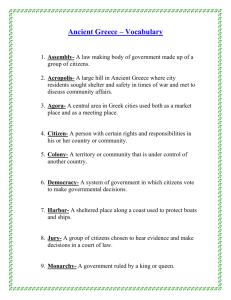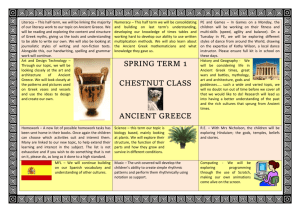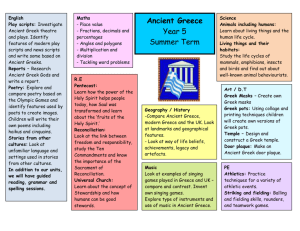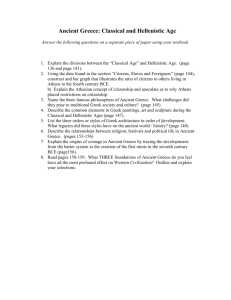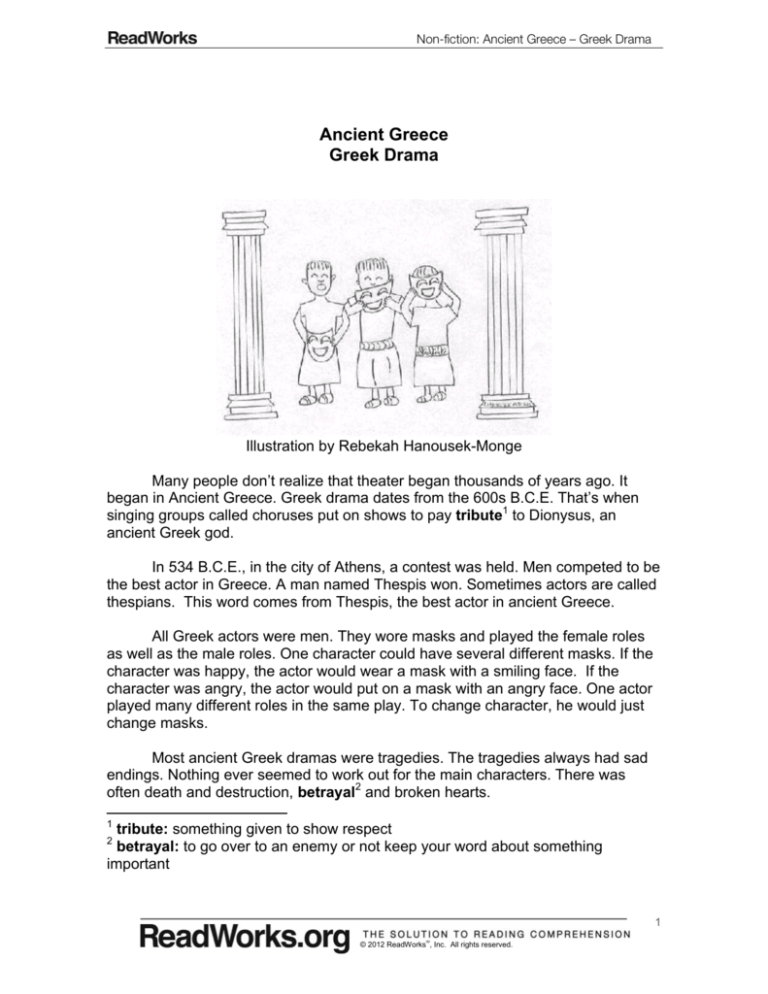
Non-fiction: Ancient Greece – Greek Drama
Ancient Greece
Greek Drama
Illustration by Rebekah Hanousek-Monge
Many people don’t realize that theater began thousands of years ago. It
began in Ancient Greece. Greek drama dates from the 600s B.C.E. That’s when
singing groups called choruses put on shows to pay tribute1 to Dionysus, an
ancient Greek god.
In 534 B.C.E., in the city of Athens, a contest was held. Men competed to be
the best actor in Greece. A man named Thespis won. Sometimes actors are called
thespians. This word comes from Thespis, the best actor in ancient Greece.
All Greek actors were men. They wore masks and played the female roles
as well as the male roles. One character could have several different masks. If the
character was happy, the actor would wear a mask with a smiling face. If the
character was angry, the actor would put on a mask with an angry face. One actor
played many different roles in the same play. To change character, he would just
change masks.
Most ancient Greek dramas were tragedies. The tragedies always had sad
endings. Nothing ever seemed to work out for the main characters. There was
often death and destruction, betrayal2 and broken hearts.
1
tribute: something given to show respect
betrayal: to go over to an enemy or not keep your word about something
important
2
1
®
© 2012 ReadWorks , Inc. All rights reserved.
Non-fiction: Ancient Greece – Greek Drama
Some Greek dramas were comedies. The comedies were full of humor. We
may not always get the jokes today. However, they were funny to the ancient
Greeks.
One thing all Greek dramas had in common was the chorus. The chorus
was usually made up of three men. The men sang throughout the performance.3
The chorus would come out between characters’ speeches. It would give an
explanation of what was happening in the play. The chorus always explained
things in song.
3
performance: a show or presentation
2
®
© 2012 ReadWorks , Inc. All rights reserved.
Questions: Ancient Greece – Greek Drama
Name: ____________________________
Date:______________________
1. What is a thespian?
a. A singer
b. An actor
c. A dancer
d. A playwright
2. The mood of a tragedy is
a. scary
b. exciting
c. sad
d. happy
3. In the passage, the word roles means
a. to do summersaults
b. fresh-baked buns
c. enormous mask
d. parts in a play
4. Which of these words best describes the purpose of the chorus?
a. Narrators
b. Scapegoats
c. Stars
d. Dancers
5. The passage “Greek Drama” is mostly about
a. Ancient Greek theater and what it was like
b. Theater and movies in modern-day Greece
c. How dramatic Greek people used to be
d. What makes a tragedy different from a comedy
3
®
© 2012 ReadWorks , Inc. All rights reserved.
Questions: Ancient Greece – Greek Drama
6. List one fact about ancient Greek drama. Then give an opinion about it.
________________________________________________________________
________________________________________________________________
________________________________________________________________
7. What would you prefer to watch, a tragedy or a comedy?
________________________________________________________________
________________________________________________________________
________________________________________________________________
8. The question below is an incomplete sentence. Choose the word that best
completes the sentence.
An actor named Thespis won an acting contest, and ________ actors are
sometimes called “Thespians” today.
a. on the contrary
b. also
c. as a result
d. before
9. Answer the following questions based on the sentence below.
Theater was invented in ancient Greece as tribute to the god Dionysus.
What? theater
(did) What? ________________________________________________________
Where? ___________________________________________________________
Why? _____________________________________________________________
10. Vocabulary Word: betrayal: an action that hurts someone who trusted you.
Use the vocabulary word in a sentence: ________________________________
________________________________________________________________
4
®
© 2012 ReadWorks , Inc. All rights reserved.



